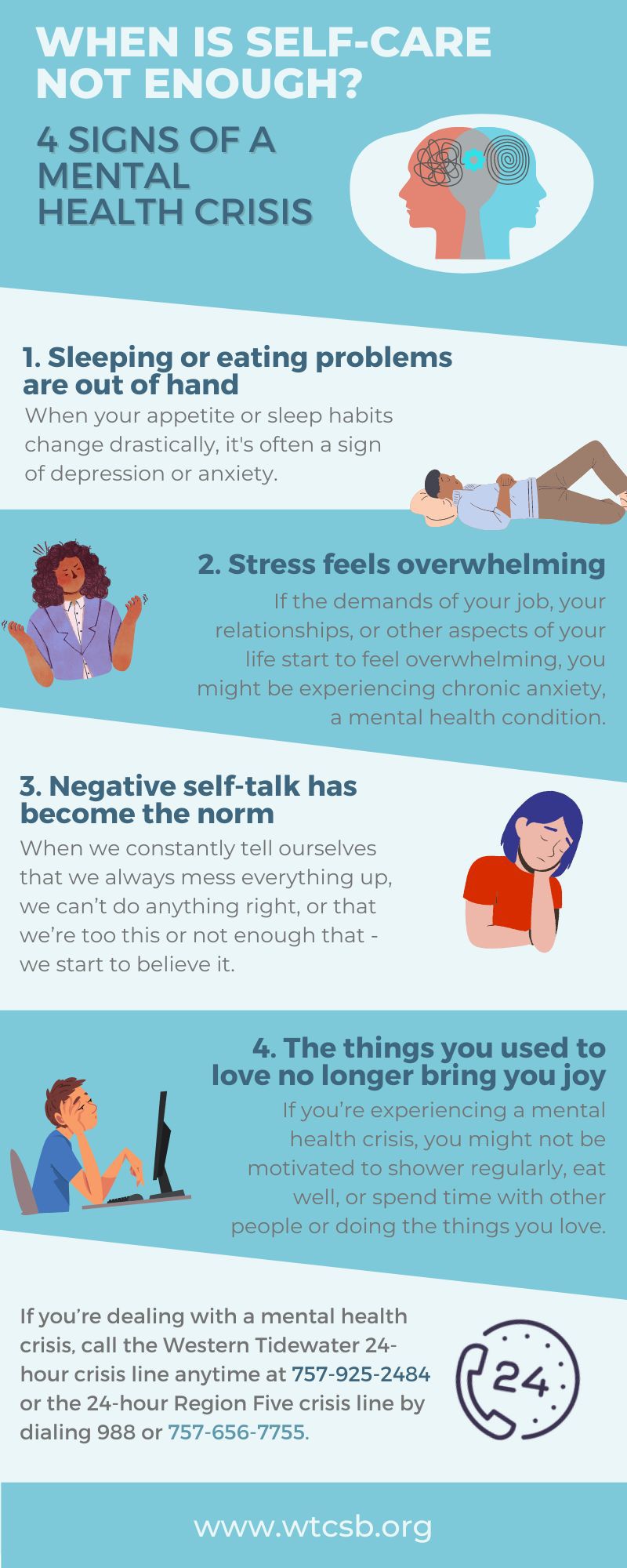‘Self-care’ has been a recurring part of the mental health lexicon for years now. Well-meaning people in your life, or maybe even your therapist, might suggest self-care to combat depression or stress, but it’s not always enough.
While taking care of ourselves is often the first step on the path to feeling better, sometimes we need something more. The thing is, with how often people tout self-care as the ultimate tool to achieve good mental health, how do you know if you’re just not taking care of yourself properly, or if something else is going on?
The Following Are 4 Signs That You Could Actually Be Experiencing a Mental Health Crisis
1. Sleeping or Eating Problems Are Seriously Affecting Your Life
Most people experience problems with sleeping or eating sometimes, due to stress, low mood, or physical health concerns, but when your appetite or sleep habits change drastically, it could be a sign of a bigger problem.
Appetite changes (feeling extra hungry, craving comfort foods, temporarily feeling happier after eating, or not feeling hungry at all) and sleep issues (trouble falling asleep, not being able to stay asleep, not feeling refreshed when you wake up, feeling tired or like you can’t concentrate during the day, or sleeping too much) can both be signs of depression or anxiety.
2. Daily Stressors Feel Overwhelming
We all experience stress. The emotional and physical responses of stress are normal, and, in the short-term, can help us to get things done – but when stress becomes anxiety – persistent, excessive worries that won’t go away – those everyday stressors can suddenly seem like way too much.
If the demands of your job, your relationships, or other aspects of your life start to feel overwhelming, you might be experiencing chronic anxiety, a mental health condition.
3. Negative (Or Downright Mean) Self-Talk Has Become the Norm
We all participate in self-talk (that’s the way you talk to yourself or what you might call your inner voice), and pretty much everyone has participated in negative self-talk from time to time (“Why would you do that? You’re so stupid sometimes.”) Frequent negative self-talk can be a serious problem for our mental health and overall happiness. When we constantly tell ourselves that we always mess everything up, we can’t do anything right, or that we’re too this or not enough that – we start to believe it.
4. The Things You Normally Do as Part of Self-Care No Longer Bring You Joy
Self-care simply means taking care of yourself. It includes the basics (practicing good hygiene, eating well, exercising, getting enough sleep), as well as meeting our emotional and spiritual needs. So, whether it’s socializing with friends, meditation, your favorite TV show or playlist, a manicure, or creating art, if it makes you genuinely happy, it can be considered part of your self-care.
And while showering might not exactly bring you joy, you sure feel good after showering, right? But if you’re experiencing a mental health crisis, you might not be motivated to shower regularly, eat well, spend time with other people or do the things you love.
Talk to Someone – Right Now
There is absolutely no shame in seeking help for a mental health condition. There is strength in recognizing that you need help. There is strength in seeking out your full potential. There is strength in knowing your worth and honoring yourself.
If you’re dealing with a mental health crisis, we can help. You can make an appointment online for same-day access, or call our 24-hour crisis line at 757-925-2484. And you can always call the Region Five 24-hour crisis line anytime by dialing 988 or, if you do not have a phone with a 757 area code, by calling 757-656-7755.
Let’s move forward, together.
Share the Infographic! Click to get the embed code
<a href=”https://www.wtcsb.org/when-is-self-care-not-enough-4-signs-youre-actually-experiencing-a-mental-health-crisis/“ target=”_blank”><img src=”https://www.wtcsb.org/wp-content/uploads/2022/08/4-Signs-Youre-Experiencing-a-Mental-Health-Crisis-2.jpg” /></a>







